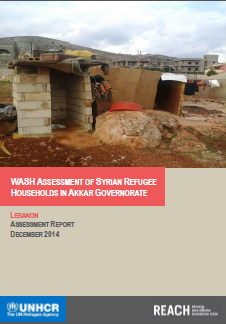WASH assessment of Syrian refugee households in Akkar Governorate
 |
report Dec 2014 ; 32 pages
Ed. REACH - Beirut OCHA - Genève UNICEF - Beirut
Downloadable format: PdF
Downloadable from the publisher
Editor Presentation
Abstract:
As the Syrian Crisis enters its fourth year, the number of Syrian refugees living in Lebanon is now exceeding 1.1 million. Such a significant population increase has placed the country’s infrastructure under strain, notably with regards to water, sanitation, and hygiene (WASH). This has been especially true for the Akkar Governorate in northern Lebanon, which now hosts more than 110,000 Syrian refugees registered with UNHCR.
The scale of the problem in Akkar was compounded by the fact that refugees live in a variety of shelter contexts and conditions, including informal settlements, unfinished buildings and homes within the host community.
Overall, the assessment found that difficulties in obtaining safe drinking water were widespread, and highlighted a crucial need to improve latrine access and quality in a substantial majority of refugee households. Contents:
SUMMARY
INTRODUCTION
METHODOLOGY
FINDINGS
I. Demographics and shelter information
- Household Demographics
- Shelter Typology
II. Water
- Water Supply Quantity and Quality
- Access to Drinking Water
- Water Storage and Treatment
III. Sanitation
- Sanitation Facilities
- Wastewater and Solid Waste Management
- Vector Control
IV. Hygiene and health
- Hygiene Practices
- Primary Health Concerns
- Awareness of the Links between Hygiene and Health
- Changing Hygiene Behaviour
CONCLUSION
ANNEXES
Target Audience:
Keywords: |
access to sanitation (CI) (DT) (ET) (ope) , access to water (CI) (DT) (ET) (ope) , humanitarian (CI) (DT) (ET) (ope) |
Country: |
Publishers/Broadcasters: |
|
REACH
-
REACH Informing more effective humanitarian action - Beirut - Lebanon |
OCHA
-
ReliefWeb - Genève - Switzerland |
UNICEF
-
United Nations Children's Fund - Beirut - Lebanon |
If there is a broken link, we will be pleased to receive a message: communication@pseau.org